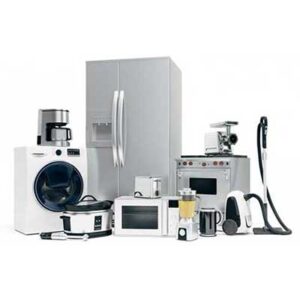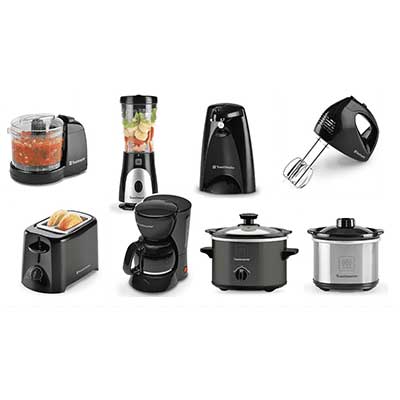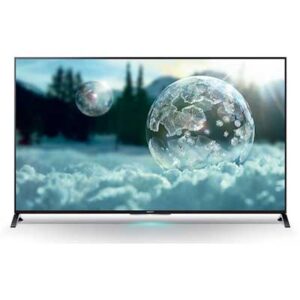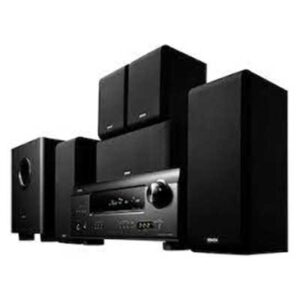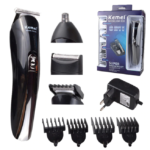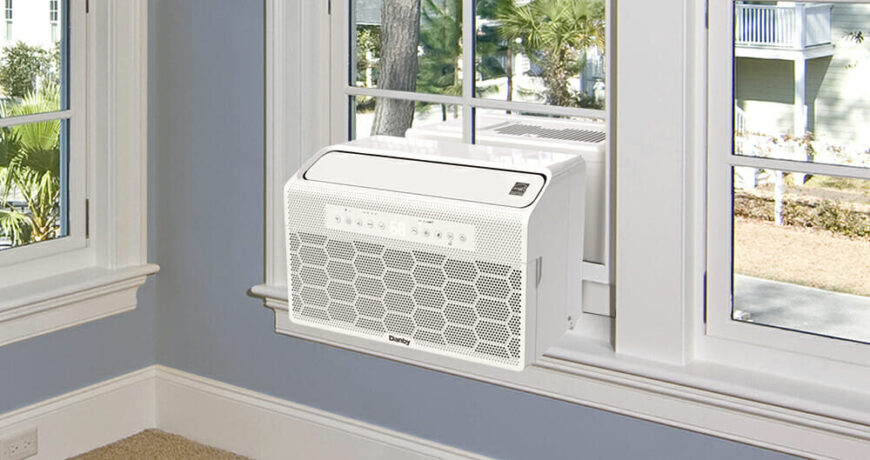No products in the cart.
How to Choose The Right Window AC Leave a comment
When the blistering summer heat sets in, keeping cool becomes a key concern for many households. One of the most efficient methods to combat the heat is by installing a window AC.
Window air conditioner is economical, handy, and offer excellent cooling for individual rooms. In this thorough tutorial, we will examine the world of window air conditioners, with a special emphasis on the selection, installation, maintenance, and troubleshooting of these cooling machines.
Whether you’re a first-time buyer or a seasoned homeowner, this guide will educate you with all the information you need to make informed selections about window air conditioner and help you keep your cool all summer long.
What Are Window AC?
Window air conditioners, also known as room air conditioners, are self-contained cooling devices meant to be put on windows or through-the-wall installations. These tiny appliances provide targeted cooling for specific rooms, making them a perfect solution for bedrooms, living rooms, workplaces, or small apartments.
Window AC consists of a compressor, condenser, evaporator, and fan, all incorporated in a single unit. They function by taking heated air from the room, chillin’ it via a refrigeration cycle, and releasing the cold air back into the area.
The Benefits Of Window AC
Window air conditioners have various benefits that make them a popular option among homes. Here are some significant benefits:
Energy Efficiency
Window air conditioners are noted for their energy efficiency. Compared to central air conditioning systems, they require much less energy, resulting in cheaper electricity costs. Additionally, their capacity to chill particular rooms lets you preserve energy by cooling just the areas that are inhabited.
Cost-Effective
Window air conditioners are cost-effective cooling options. They are often more cheap than central air conditioning systems and need no extra ducting or costly installation. With window air conditioners, you may produce a nice interior atmosphere without breaking the budget.
Easy Installation
Installing a window AC is an easy task that can be accomplished by most households. With simple equipment and no work, you can have your window air conditioner up and running in no time. The ease of installation makes window air conditioners a useful alternative for both homeowners and renters.
Space-Saving Design
One of the striking characteristics of window air conditioners is their space-saving design. These devices are tiny and fit straight into a window or a specially constructed space in the wall. By leveraging existing window or wall openings, window air conditioners remove the need for extra floor or wall space, making them perfect for compact living rooms.
Individual Room Cooling
Window air conditioners offer targeted cooling, enabling you to chill certain rooms according to your requirements.
This customized cooling strategy is especially helpful in houses where some regions demand more cooling than others.
By putting window AC in strategic areas, you may experience individualized comfort throughout your house.
Choosing The Right Window AC
Selecting the appropriate window air conditioner is vital for efficient and effective cooling. Here are some points to consider when purchasing a window air conditioner for your space:
Cooling Capacity
The cooling capability of a window AC is measured in British Thermal Units (BTUs). It displays the amount of heat the unit can remove from a room within an hour.
Choosing the correct cooling capacity relies on the size of the space you plan to cool. A unit with inadequate BTUs may struggle to chill the space sufficiently, while an enormous unit may contribute to excessive energy use.
Refer to the manufacturer’s specifications or speak with an expert to establish the optimum cooling capacity for your space.
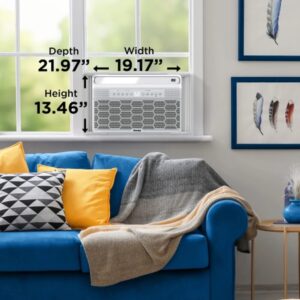
Energy Efficiency Ratio (EER)
The Energy Efficiency Ratio (EER) is a measure of a window air conditioner’s energy efficiency. It reflects the cooling output (in BTUs) divided by the power input (in watts).
A higher EER implies greater energy efficiency, resulting in reduced operational costs. When comparing various models, search for units with higher EER ratings to achieve best energy savings.
Noise Level
The noise level generated by a window air conditioner may vary dramatically across models. If you’re sensitive to noise or want to use the unit in a bedroom or workplace, consider purchasing a model with a low noise level.
Look for air conditioners branded as “quiet operation” or read customer reviews to measure the noise level before making your purchase.
Additional Features
Window air conditioners typically come with extra features that increase convenience and user experience.
These features may include programmable timers, remote controls, adjustable fan speeds, sleep modes, and air purifiers.
Assess your individual requirements and preferences to identify which characteristics are crucial to you.
Sizing Considerations For Window AC
Proper size is crucial when purchasing a window air conditioner. An oversized unit may result in short-cycling, when the unit often switches on and off, lowering efficiency and longevity.
On the other side, a tiny unit may fail to chill the room adequately. To find the suitable size for your room, consider the following factors:
Room Size
The size of the space has a crucial impact in determining the cooling capacity needed. Measure the length, breadth, and height of the space then multiply these measurements to obtain the room’s cubic footage.
Refer to the manufacturer’s sizing instructions to obtain the proper BTU rating for your room size.
Insulation
The degree of insulation in the room impacts the cooling needs. Well-insulated rooms keep cold air more efficiently, needing less cooling capacity.
Conversely, poorly insulated rooms may need higher BTUs to compensate for the heat gain. Consider the insulation quality of your space when deciding the size of your window air conditioner.
Heat-Generating Appliances
Appliances such as refrigerators, ovens, and electronics emit heat, adding to the total cooling load of the space.
If your room contains heat-generating gadgets, consider their heat output while picking a window air conditioner.
Choose a unit with a larger BTU rating to compensate for the excess heat produced by these items.
Installation Guide for Window AC
Installing a window air conditioner comprises the following steps:
- Step 1: Choose the Window
Select a window that is near to a power supply and adequate for fitting the air conditioner’s measurements. Ensure the window is in excellent shape and can be opened and closed effortlessly.
- Step 2: Prepare the Window
Clean the area surrounding the window and eliminate any impediments. Measure the window opening to calculate the required changes. Some air conditioners may need a support bracket or a sealing kit for effective installation.
- Step 3: Mount the Air Conditioner
Carefully set the air conditioner on the windowsill and fasten it according to the manufacturer’s instructions. Ensure the item is level and properly sealed to avoid air leakage.
- Step 4: Seal the Gaps
Use weatherstripping or sealing foam to plug any gaps between the air conditioner and the window. This helps enhance energy efficiency and keeps outside air from entering the interior.
- Step 5: Connect the Power
Plug the air conditioner into a grounded electrical socket. Ensure the electrical circuit can manage the unit’s power needs to prevent overloading.
- Step 6: Test the Unit
Turn on the air conditioner and test its cooling performance. Check for any strange sounds, vibrations, or leaks. Adjust the parameters according to your comfort preferences.
It’s worth mentioning that these procedures are broad recommendations, and the particular installation method may differ based on the model and manufacturer.
Always refer to the manufacturer’s instructions for complete installation methods.
Maintaining Your Window AC
Proper maintenance is vital for the maximum performance and durability of your window air conditioner. Here are some maintenance guidelines to keep in mind:
Regular Cleaning
Clean the air filters periodically to eliminate dust, grime, and debris that may restrict airflow and diminish cooling effectiveness. Refer to the manufacturer’s instructions for help on cleaning and changing the filters.
Coil Cleaning
The evaporator and condenser coils may acquire dirt and grime over time, impeding heat exchange and lowering cooling performance.
Clean the coils yearly or as suggested by the manufacturer using a soft brush or vacuum cleaner.
Check For Leaks
Inspect the air conditioner for any indicators of refrigerant leakage, such as oil streaks or hissing noises. If you detect a leak, call a professional technician to fix and replenish the refrigerant.
Clear The Drainage Path
Window air conditioners remove humidity from the air, and the condensation gathers in a drainage pan or tray. Ensure the drainage line is clear of impediments, enabling the water to flow easily. Clean the drainage system periodically to avoid mold or mildew accumulation.
Exterior Maintenance
Inspect the outside components of the air conditioner, such as the fan and vents, for any obstructions or damage. Remove any dirt and ensure optimum ventilation for maximum operation.
Troubleshooting Common Issues
Even with careful maintenance, window air conditioners may experience complications. Here are some frequent difficulties and troubleshooting tips:
Air Conditioner Not Cooling
If the air conditioner is functioning but not producing adequate cooling, examine the following:
- Ensure the temperature is set appropriately.
- Clean or replace the air filters if they are unclean or blocked.
- Check for blocked vents or anything that may hinder airflow.
- Verify that the unit is the suitable size for the space.
Water Leakage
Water seeping from the air conditioner may indicate a congested drainage system. Check for clogs and clean the drainpipe if required. Ensure the unit is level to avoid water buildup.
Strange Noises
Unusual sounds, such as rattling or screeching, may indicate a loose component or a damaged fan motor. Turn off the device and examine for any loose components or trash. If the situation continues, call a professional technician for repairs.
Electrical Issues
If the air conditioner fails to switch on, check the power source and verify the device is firmly hooked into a functional outlet.
If the issue continues, seek a certified electrician to investigate the electrical connections.
For more difficult concerns or problems beyond your knowledge, it is advisable to seek professional help from a registered HVAC specialist.
Frequently Asked Questions (FAQs)
Q1: How much does a window air conditioner cost?
A1: The cost of a window air conditioner might vary based on the brand, size, features, and energy efficiency. On average, costs vary from $150 to $800.
Q2: Can I install a window air conditioner myself?
A2: Yes, most window air conditioners come with installation instructions that make it easy for homeowners to install them themselves. However, if you are hesitant or uncomfortable with the installation procedure, it’s advisable to engage an expert.
Q3: Can I use an extension cable for my window air conditioner?
A3: It is typically suggested to avoid utilising an extension cable for window air conditioners. These gadgets need a reliable and dedicated power source. If an extension cable is required, ensure it is a heavy-duty cord that can manage the unit’s power needs.
Q4: How frequently should I clean the air filters?
A4: It is advisable to clean or replace the air filters every 30 days or as stated by the manufacturer. Regular cleaning maintains maximum ventilation and cooling effectiveness.
Q5: Can I cover my window air conditioner during the winter?
A5: Covering your window air conditioner throughout the winter may help protect it from the weather. However, ensuring the cover is permeable and enables ventilation to avoid moisture accumulation, which may lead to mildew or rust. Consult the manufacturer’s instructions for precise suggestions.
Q6: How long do window air conditioners normally last?
A6: With good maintenance, window air conditioners may last roughly 10 to 15 years. Regular cleaning, filter change, and expert inspections add to the life of the machine.
Conclusion
Window air conditioners from The Home Depot offer an efficient and cost-effective alternative for remaining cool throughout the hot summer months.
By knowing the selection, installation, maintenance, and troubleshooting elements of window air conditioners, you can make educated choices and guarantee maximum performance and durability of your cooling device.
Remember to pick the proper size, consider energy efficiency, and execute regular maintenance to enjoy a pleasant and refreshing interior atmosphere.

